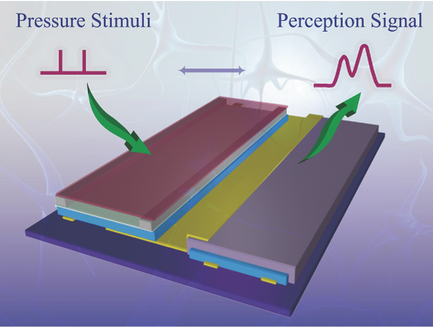Scientists Develop a Neuron-inspired Organic Tactile Perception System
During the past decades, chemists have developed many high mobility organic semiconductors for flexible and low-cost organic field-effect transistors (OFETs). These progresses create fascinating opportunities for multifunctional OFETs for intelligent applications. During the recent years, scientists from key Laboratory of Organic Solids, Institute of Chemistry Chinese Academy of Sciences (ICCAS) have carried out systematic studies in the area of organic electronics. With the innovation in both functional materials and device design, they have demonstrated a series of OFET based flexible sensors with smart applications (Nat. Commun. ; Adv. Mater.; Adv. Mater. ). Moreover, they proposed self-powered dual-parameter temperature–pressure sensors based on microstructure-frame-supported organic thermoelectric materials. The result is highlighted as “the first that combines the concept of thermoelectricity with a porous elastic system”
Recently, they extended their research to a more challenge topic of developing bionic perception system with not only sensing, but also the neuron-inspired signal-processing functions. By creating the bionic/electronic interface in OFET, they demonstrated an organic synaptic transistor which emulates the single processing functions of biological synapses. By subsequently designing a dual-organic transistor structure composing of the synaptic OFET and pressure sensing OFET, they developed bionic tactile perception systems with integrated pressure sensing and neuron-inspired signal processing functions in a single element. Benefitting from these features, this bionic system can “percept” the comprehensive tactile information of pressures, time durations and magnitudes. The combined bionic functionality of tactile perception systems, together with their unique features of flexibility and large-area fabrication, make this system possess promising application in novel e-skin devices and robotic elements. This work has been published in Advanced Materials. and featured by a research highlight in Nat. Rev. Mater. . This demonstration has been highly evaluated as “this system represents a step forward for the fabrication of flexible electronic skin devices that mimic the functionality and sensitivity of skin”.
The research work was financially supported by the National Natural Science Foundation of China, 973 program and the "Strategic Priority Research Program" of CAS.

Schematic illustration of OFET based tactile perception system. (Image by Prof. DI Chongan)
Contact:
Prof. DI Chongan
Institute of chemistry, chinese Academy of Sciences
Email: dicha@iccas.ac.cn





